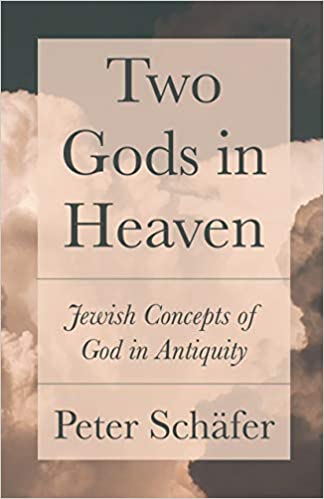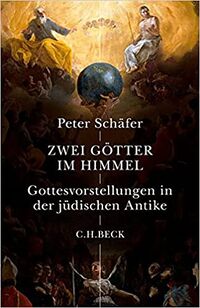File:2020-T Schafer en.jpg
2020-T_Schafer_en.jpg (324 × 499 pixels, file size: 20 KB, MIME type: image/jpeg)
Peter Schäfer, Two Gods in Heaven: Jewish Concepts of God in Antiquity, tr. Allison Brown (Princeton, NJ: Princeton University Press, 2020).
English ed. of Peter Schäfer, Zwei Götter im Himmel: Gottesvorstellungen in der jüdischen Antike' (Munich, Germany: C.H. Beck, 2017).
Abstract
"A book that challenges our most basic assumptions about Judeo-Christian monotheism ... Contrary to popular belief, Judaism was not always strictly monotheistic. Two Gods in Heaven reveals the long and little-known history of a second, junior god in Judaism, showing how this idea was embraced by rabbis and Jewish mystics in the early centuries of the common era and casting Judaism's relationship with Christianity in an entirely different light ... Drawing on an in-depth analysis of ancient sources that have received little attention until now, Peter Schäfer demonstrates how the Jews of the pre-Christian Second Temple period had various names for a second heavenly power―such as Son of Man, Son of the Most High, and Firstborn before All Creation. He traces the development of the concept from the Son of Man vision in the biblical book of Daniel to the Qumran literature, the Ethiopic book of Enoch, and the Jewish philosopher Philo of Alexandria. After the destruction of the Second Temple, the picture changes drastically. While the early Christians of the New Testament took up the idea and developed it further, their Jewish contemporaries were divided. Most rejected the second god, but some―particularly the Jews of Babylonia and the writers of early Jewish mysticism―revived the ancient Jewish notion of two gods in heaven ... Describing how early Christianity and certain strands of rabbinic Judaism competed for ownership of a second god to the creator, this boldly argued and elegantly written book radically transforms our understanding of Judeo-Christian monotheism."--Publisher description.
""In this book Peter Schäfer casts light on the common assumption that Judaism from its earliest formulations was strictly monotheistic. Over and over again in the Hebrew Bible the biblical writers insist upon the idea that there is one and only one God. But the biblical text is multifarious and contains many sources that subvert from within the strong monotheistic thesis. Old Canaanite deities such as Baal and El, although pushed to the edges, prove stubbornly persistent. They come to the forefront in, for example, the famous "Son of Man" of chapter 7 of the Book of Daniel. In sum, Schäfer argues that monotheism was an ideal in ancient Judaism that was consistently aspired to, but never fully achieved. Through close textual analysis of the Bible and certain key post-biblical sources, Schäfer tracks the long history of a second, younger, subordinate God next to the senior Jewish God YHWH. One might expect that with early Christianity's embrace of this idea (in the form of Jesus Christ), Judaism would have abandoned it utterly. But the opposite was the case. Even after Christianity usurps the original Jewish notion of a second, younger God, certain post-biblical Jewish circles-in particular early Jewish mystical circles-maintained and revived it with the archangel "Metatron," a controversial figure whose very existence is questioned and fiercely debated by the rabbis of the Babylonian Talmud. This book was originally published in Germany by C.H. Beck Verlag in 2017"--Publisher description.
Contents
Introduction: One God? --; 1. The Son of Man in the Vision of Daniel --; 2. The Personified Wisdom in the Wisdom Literature --; 3. The Divinized Human in the Self-Glorification Hymn from Qumran --; 4. The Son of God and Son of the Most High in the Daniel Apocryphon from Qumran --; 5. The Son of Man-Enoch in the Similitudes of the Ethiopic Book of Enoch --; 6. The Son of Man-Messiah in the Fourth Book of Ezra --; 7. The Firstborn in the Prayer of Joseph --; 8. The Logos according to Philo of Alexandria --; Transition: From Pre-Christian to Post-Christian Judaism --; 9. The Son of Man in the Midrash --; 10. The Son of Man-Messiah David --; 11. From the Human Enoch to the Lesser God Metatron --; Conclusion: Two Gods
External links
File history
Click on a date/time to view the file as it appeared at that time.
| Date/Time | Thumbnail | Dimensions | User | Comment | |
|---|---|---|---|---|---|
| current | 08:32, 14 December 2021 |  | 324 × 499 (20 KB) | Gabriele Boccaccini (talk | contribs) |
You cannot overwrite this file.
File usage
The following page uses this file:

